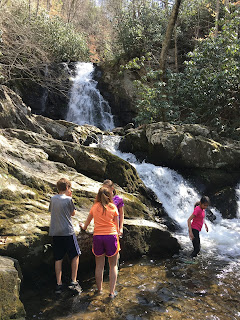The view from the top of GSMNP
“Keep close to Nature's heart... and break clear away, once in awhile, and climb a mountain or spend a week in the woods. Wash your spirit clean.”
~ John Muir
This March, our Grade 5 and 6 students took their field work on the road all the way to Townsend, TN to spend a week living and learning in the Great Smoky Mountain National Park. We partnered with the folks at Great Smoky Mountains Institute at Tremont to provide in-depth experiences through education programs that celebrate ecological and cultural diversity, foster stewardship, and nurture appreciation of Great Smoky Mountains National Park. One of the aims of this trip is to give children valuable individual and social skills as well as exposing them to the ecological processes, resources, and the sheer wonder of Great Smoky Mountains National Park.
Simon reflecting alongside the Middle Prong River
The purpose of the environmental studies program at Tremont is to provide the students with authentic learning experiences around such topics as geology, wildlife, stream ecology, and issues facing our National Parks. The students participated in field science, kept journals, created artwork, reflected on their experiences, and enjoyed the beauty of the Smokies. The teaching components of the trip were led by myself as well as by Tremont’s staff of professional teacher-naturalists.
Lucy and Noor investigating specimens found along the Dorsey Branch
This five-day expedition is an integral part of the experiential science curriculum in grades 4-5-6 at Chesterfield Day School. The students worked with the teacher-naturalists at the park to collect data that will be used in their 6th grade year when they complete a comparative study of the Ozark mountains. This trip allows for students to grow their abilities as field biologists, geologists, and naturalists while working alongside the teacher-naturalists from the park. Our Grade 5 students will build upon this experience next year when they complete their Ozark study independently.
Spruce Flat Falls - Geology Day
Enduring Understandings:
- As scholars we engage ourselves in meaningful learning to develop connections and grow.
- As stewards of our world and resources, we impact the future.
- Our diverse perspectives provide opportunities for new ideas and change.
- As active citizens, we create a thriving community through collaboration and service.
Hiking on the AT
Essential Questions:
- How do we pass the land and resources to the next generation in better condition than they were found?
- How can technology help us create a sustainable balance between the Earth’s resources and human needs?
- In what ways do our actions today shape the future of our world?
- How do unique perspectives influence how people see the world?
- How can conflict lead to change?
- How does reflection impact our learning?
- What does my community need from me?
- As an active citizen, what are my roles and responsibilities within my community?
- Why is it important to collaborate to accomplish meaningful work?
Mapping our route before heading out on the hike
To be clear, this is the first part of a two-part project. For that reason, I don’t want to go into too much detail about what the students learned on the trip because after the second phase of the project the students will be creating a display that highlights their learning and compares/contrasts both the Smoky mountain region with our own Ozark mountains.
Eli collecting temperature data on our Rivers and Streams Day
While we did learn a great deal about science and the region, these trips also teach students a lot about themselves and their role in the community. These trips are intense… long days, close quarters, far from home… A former colleague, and current teacher at MICDS, surmised it best when she said “Even when it looks like they ain’t learning… they are.”
Jack recording and organizing his data in his journal
Here is a sample of one of our student reflections from their field journal:
“A lot of the time we look over ourselves and our importance and start focusing on others. We should remember that the power of ourselves is no less than others and therefore we have the power to effect the world equal as anyone or anything. So the way to change the environment is to firstly change ourselves. Telling people to change themselves won’t work if they aren’t focused on themselves and are worried for others. If we change ourselves to always do what is right and good… if we all do that the world will become better. We can inspire change in others by making a change in ourselves.”
– Arushi
Special thanks to all of our chaperones on this trip. Without them none of this would be possible! These folks gave up their lives and families for a week to make this trip happen and I literally can not thank them enough. You rule the nation!
While studying high country ecology we hiked a 2-mile section of the AT
Alexis Mićić
Debbie Bott
David Fitzler
Darren Haskell
Kathy Kilo-Peterson
Charu Katyal
Aaron Klasing
Rob Leavitt
On the bridge to Girl Scout Island










No comments:
Post a Comment